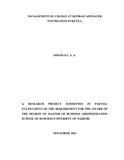| dc.description.abstract | Change is something organization must adopt if they are to survive and compete in
today’s business world. When change in an organization is taking place, it is important
that the change is managed so as to ensure its smooth and timely implementation of
change, reduce uncertainty, increase an organization’s productivity and enable it
anticipate future change. The Konrad Adenauer Foundation (KAF), a German Political
Foundation based in Nairobi has over the years undergone several changes which
include a change in its project financial management system, introduction of an
additional program, and project as well as change in culture. The objectives of this
study were to determine the change management approaches that the organization had
adopted as well as the factors that influenced the management of change in the
organization. The research design adopted for this study was a case study. To meet the
objectives of the study, primary data was collected using an interview guide was that
administered to the head of HR and a Program Officer and responses captured on a tape
recorder. The data collected was then analyzed using content analysis. The key
findings of the study are that changes in KAF were initiated by top-management and
were mainly characterized by minimal behavioral resistance which was managed
through coercion, inadequate communication, limited staff awareness of and
involvement in change. The findings further established that the change management
process was positively influenced by factors such as leadership commitment, employee
training, availability of resources and a favorable organizational structure while they
were negatively impacted by mild behavioral resistance, the individualistic
organizational culture, inadequate employee involvement in the changes as well as
insufficient communication. The study concludes that change in KAF was mainly
planned and involved top-down implementation and recommends that the organization
should enhance the capacity of employees and leaders to enable them deal with change
as well as retain its current organization structure, enhance communication and
employee involvement during change processes. | en |

